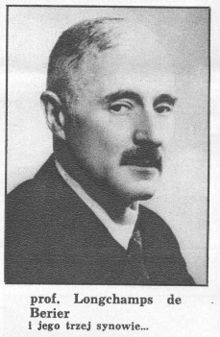
Roman Longchamps de Bérier
Encyclopedia

Poland
Poland , officially the Republic of Poland , is a country in Central Europe bordered by Germany to the west; the Czech Republic and Slovakia to the south; Ukraine, Belarus and Lithuania to the east; and the Baltic Sea and Kaliningrad Oblast, a Russian exclave, to the north...
lawyer and university professor, one of the most notable specialists in civil law
Civil law (legal system)
Civil law is a legal system inspired by Roman law and whose primary feature is that laws are codified into collections, as compared to common law systems that gives great precedential weight to common law on the principle that it is unfair to treat similar facts differently on different...
of his times and the last rector
Rector
The word rector has a number of different meanings; it is widely used to refer to an academic, religious or political administrator...
of the Jan Kazimierz University of Lwów. He was murdered in what became known as the Massacre of Lwów professors.
Roman Longchamps de Bérier was born in 1883 in Lwów (now Lviv), then a city in Austro-Hungarian
Austria-Hungary
Austria-Hungary , more formally known as the Kingdoms and Lands Represented in the Imperial Council and the Lands of the Holy Hungarian Crown of Saint Stephen, was a constitutional monarchic union between the crowns of the Austrian Empire and the Kingdom of Hungary in...
Galicia, to a notable family of distant French extraction who left France for Poland in the 16th century. The French surname of his family gave the name of one of the suburbs of the city, Lonszanówka (modern Lonsanivka). After finishing his studies he became a specialist in civil law. In 1918 he served as a volunteer during the Battle of Lwów (1918)
Battle of Lwów (1918)
Battle of Lviv begun on 1 November 1918 and lasted till May 1919 and was a six months long conflict between the forces of the West Ukrainian People's Republic and local Polish civilian population assisted later by regular Polish Army forces for the control...
and the ensuing Polish-Ukrainian War
Polish-Ukrainian War
The Polish–Ukrainian War of 1918 and 1919 was a conflict between the forces of the Second Polish Republic and West Ukrainian People's Republic for the control over Eastern Galicia after the dissolution of Austria-Hungary.-Background:...
.
In 1920 he became a professor at the Faculty of Law of the Jan Kazimierz University of Lwów. Two years later he was appointed a member of the Commission of Codification of the Republic of Poland, where he took part in preparation of the Polish civil law. In 1931 he became a member of the Polish Academy of Skills and in 1936 he was appointed a member of the Competention Tribunal, one of the bodies crucial in solving conflicts between the legislative, executive and jurisdicial branches of the power.
After the outbreak of the Polish Defensive War
Invasion of Poland (1939)
The Invasion of Poland, also known as the September Campaign or 1939 Defensive War in Poland and the Poland Campaign in Germany, was an invasion of Poland by Germany, the Soviet Union, and a small Slovak contingent that marked the start of World War II in Europe...
of 1939 he was one of the co-founders of the Civilian Committee of Defense of Lwów that organized the defense of that city during the siege of that city
Battle of Lwów (1939)
The Battle of Lwów was a battle for the control over the Polish city of Lwów between the Polish Army and the invading Wehrmacht and the Red Army...
. After the city surrendered to the Soviets and was annexed by the USSR he was deposed of his office, but remained one of the professors of the university. After the outbreak of the Russo-German War
Operation Barbarossa
Operation Barbarossa was the code name for Germany's invasion of the Soviet Union during World War II that began on 22 June 1941. Over 4.5 million troops of the Axis powers invaded the USSR along a front., the largest invasion in the history of warfare...
in 1941, on July 4 he was arrested by the Nazis and murdered in what became known as the massacre of Lwów professors
Massacre of Lwów professors
In July 1941, 25 Polish academics from the city of Lwów, Poland ; now in Ukraine) were killed by Nazi German occupation forces along with their families and guests...
. Among the victims were also three of his sons: Bronisław (b. 1916), Zygmunt (b. 1918) and Kazimierz (b. 1923).

